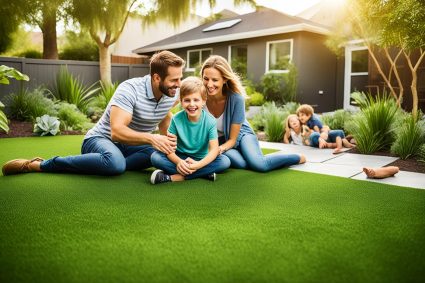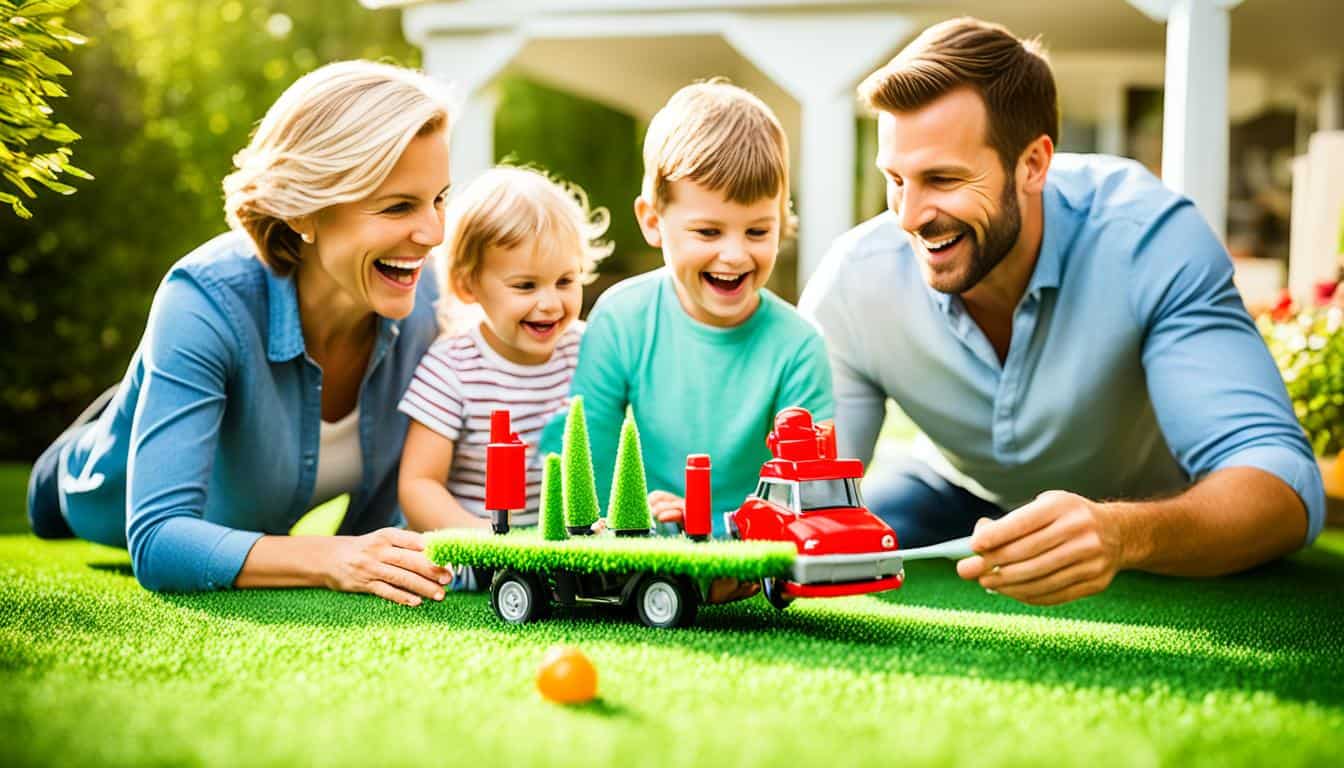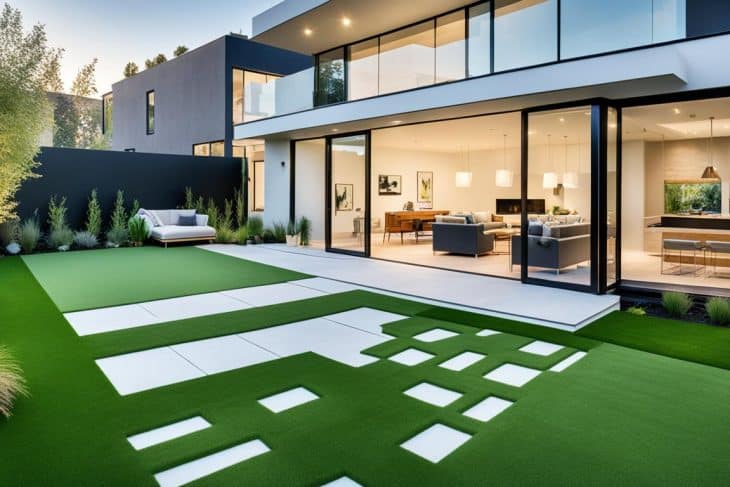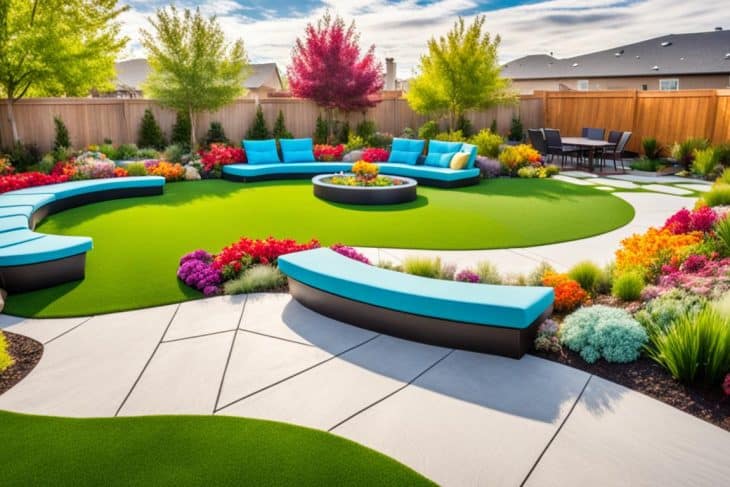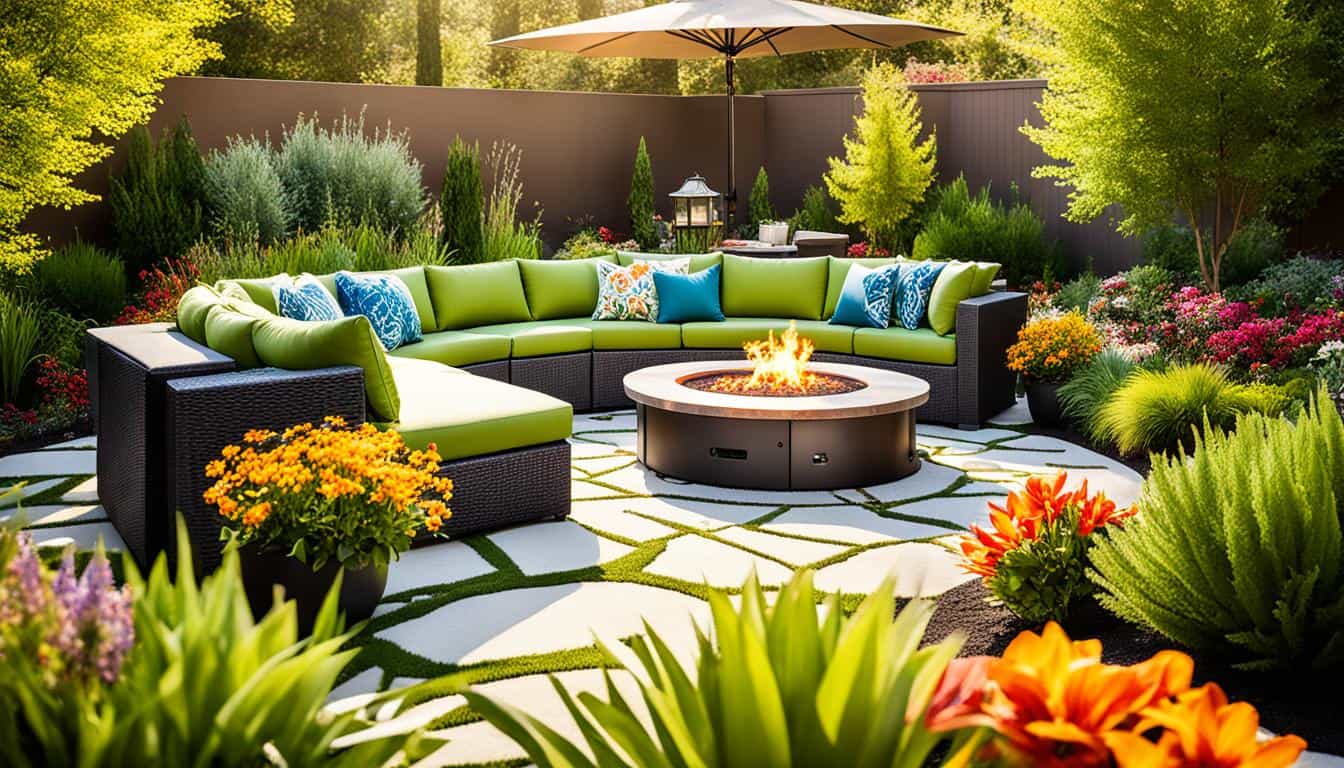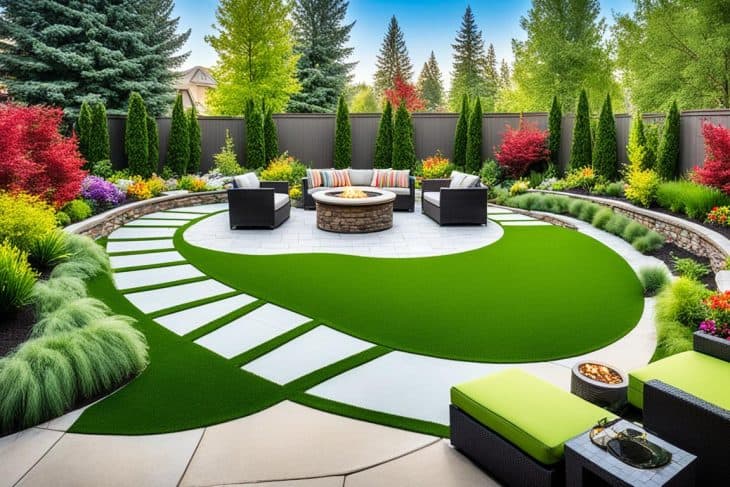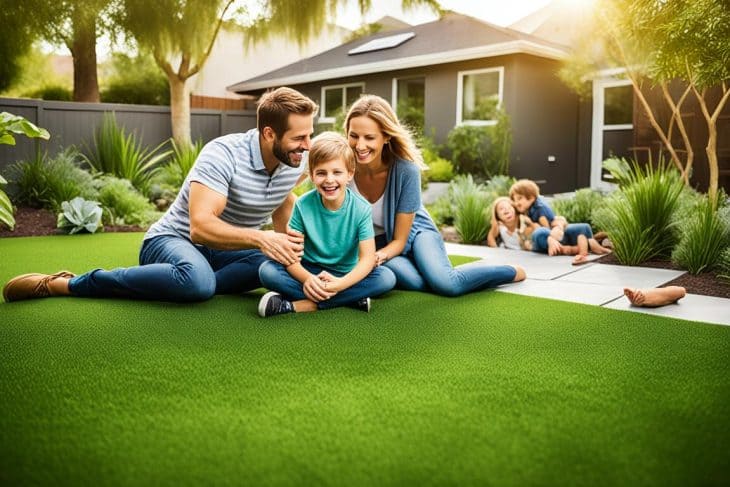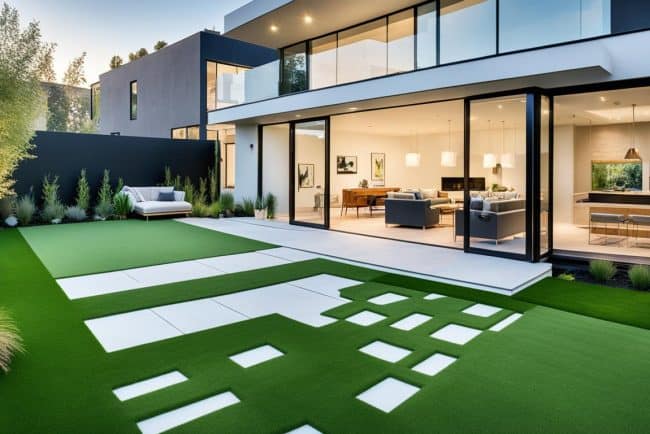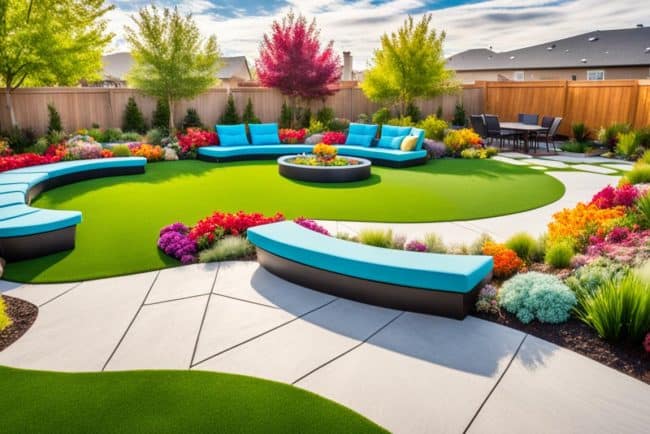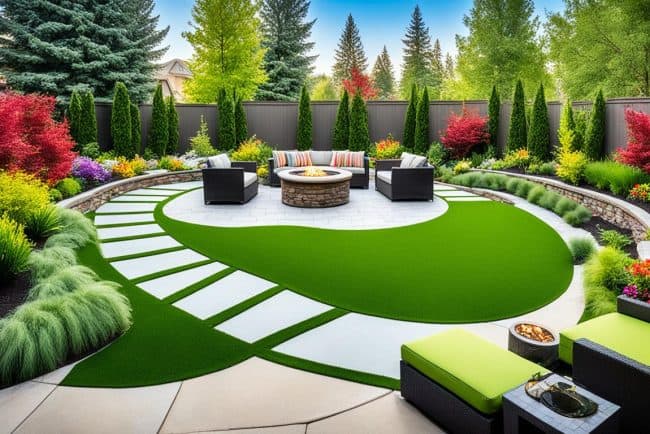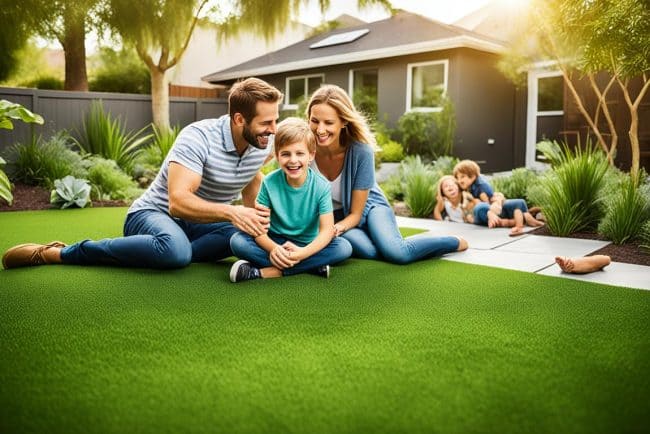Did you know that using artificial grass can help homeowners save up to $750 a year on water? It’s an important step towards sustainable landscaping. Artificial grass needs less water, fertilizers, and pesticides. This choice helps create a green lawn with less effort and is better for our planet.
Choosing artificial grass means using less water and fewer chemicals. It is becoming popular in North America for these reasons. It also stays looking good all year long. For the best results, picking a reputable brand like Smart Turf Artificial Grass is smart.

The Role of Artificial Grass in Sustainable Landscaping
Using artificial grass has turned my yard into an eco-friendly haven. It is a strong and green option. This means I use much less water, which is a big issue with regular lawns. While real grass needs lots of water, artificial grass stays green with little moisture, saving a lot of water.
Artificial grass also cuts down on greenhouse gases. It does this by getting rid of the need for fossil fuels used in yard work. This makes it a great pick for those who love eco-friendly landscaping. Plus, it means I don’t have to use harmful chemicals in my garden. This helps keep the air and water around us clean, protecting animals and plants.
This type of turf can last for 15 years or even longer if taken care of. And it’s easy to look after. I don’t have to water, cut, or add nutrients to it. This not only saves time but also money. It looks great without the high cost and effort that comes with regular lawns.
My yard is now a quiet place to enjoy. Without the noise from mowers and other tools, it’s peaceful. I love that artificial grass is good for the planet and saves resources. Plus, it makes my outdoor space look and feel better.
| Benefit | Traditional Lawns | Artificial Grass |
|---|---|---|
| Water Consumption | High | Minimal |
| Fossil Fuel Use | High | Low |
| Maintenance | Frequent | Low |
| Allergen Production | High | Low |
| Durability | Medium | High |
| Environmental Impact | High | Low |
Water Conservation Benefits of Artificial Grass
Artificial grass plays a big role in saving water. It needs much less water than regular lawns. In dry areas, it helps lower water bills.
Artificial grass cuts the need for harmful chemicals like pesticides and fertilizers. This protects our water from getting dirty. It’s a big win for the environment.
Artificial grass stays green without much work. This saves water and time. For busy people, it means less work and more savings.

It also helps stop soil erosion when it rains hard. Some worry it might not attract bees or butterflies. But its benefits for saving water are clear and important.
| Aspect | Artificial Grass | Natural Grass |
|---|---|---|
| Water Consumption | Minimal to none | Regular watering required |
| Chemical Use | None | Fertilizers, pesticides, herbicides |
| Maintenance Requirements | Low | High (mowing, watering, fertilizing) |
| Erosion Control | Effective | Limited |
| Represents Long-term Investment | Yes | Potential short-term costs |
Choosing artificial grass is a smart move for saving water. It makes outdoor spaces look good sustainably.
Durability and Longevity of Eco-Friendly Turf
Choosing eco-friendly turf for your yard has big benefits. These benefits include durability and how long it lasts. Today’s synthetic grass looks and feels like real grass but is tougher. It can withstand different weather conditions. Thanks to advanced materials, artificial turf keeps its color and vibrancy for many years. This means I don’t have to replace it often, saving time and money.
Eco-friendly turf can last up to 25 years. It’s perfect for homeowners who want a yard that’s easy to take care of. You won’t need to mow, fertilize, or water synthetic grass as you would with real grass. Because of this, you’ll do less work and use less water. This is great for places with little water. It lets me save water while still having a lovely yard.
Eco-friendly turf is a smart choice for sustainable gardening. It lasts a long time and is tough, making it great for improving outdoor areas. At the same time, it helps the environment.
Enhanced Aesthetics for Your Outdoor Spaces
Artificial grass makes outdoor spaces look better. It keeps gardens and homes looking lush. Synthetic turf stays green all year, unlike natural grass which can turn brown.
With artificial grass, your outdoor area always looks well-kept. This makes it great for enjoying any time of the year.
Creating a Lush and Inviting Environment
Artificial turf can be used in many places, like backyards and balconies. It makes these areas perfect for having fun or just relaxing. You can choose how it looks to match what you like.
This makes outdoor spots welcoming places to spend time. Also, synthetic grass makes it cheaper to have a beautiful garden. It doesn’t need as much care as regular grass does.
Year-Round Green: Regardless of the Season
Artificial grass stays green all the time. Natural lawns can have trouble when the weather changes. But synthetic grass always looks good, no matter the season.
This makes my home more attractive from the outside. It also makes the outdoor areas nicer for hanging out with my loved ones. With artificial grass, keeping a lovely landscape is easy.

Sustainable Landscaping Tips with Artificial Grass
Choosing artificial grass for my yard is a great way to be more eco-friendly. One key tip is picking high-quality artificial turf. It lasts longer and means less waste. Additionally, getting it installed properly is crucial. It helps the turf work better and makes my yard look amazing.
Adding native plants alongside artificial grass shows a deep commitment to green living. These plants are easy to care for and save money on upkeep. Also, they help save water. This is important since a lot of the Earth’s best soil has disappeared in recent years. Thinking about how only 2.5% of the Earth’s water is fresh puts things into perspective.
Artificial grass isn’t just for lawns. It can be used to green up balconies or create areas for pets to enjoy. These uses match my goal of having easy-to-care-for spaces that also help the planet. Artificial turf looks good and is an important piece of eco-friendly landscaping.
| Feature | Benefits |
|---|---|
| High-Quality Materials | Increased durability and reduced waste |
| Professional Installation | Optimal performance and aesthetics |
| Native Plants | Lower maintenance and enhanced water conservation |
| Versatile Uses | Creative applications for diverse settings |
| Water Conservation | Vital for sustainable living and combating drought |
Low Maintenance Requirements for Busy Homeowners
Artificial grass means less work for busy homeowners. It lets me enjoy my yard without the usual lawn care stress. No more hours spent mowing, watering, or fertilizing.
Now, I use my time to enjoy my lawn, not work on it.
Reducing Time and Effort in Lawn Care
Artificial grass saves a lot of time. It cuts out frequent lawn tasks. There’s no need for regular, hard work to keep it up.
This means I have more freedom. I can spend my weekends outdoors with loved ones, not working in the yard.
Cost Savings Over Time
Artificial grass also saves money over time. Natural lawns cost a lot for water, fertilizer, and care services. But synthetic turf cuts these costs.
The upfront cost pays off with lower bills and less spending on upkeep. Artificial grass is a smart, sustainable option. It keeps my lawn looking great and saves resources.

Eco-Friendly Aspects of Artificial Grass
Choosing artificial grass offers numerous eco-friendly benefits that align with my dedication to sustainability. A key benefit is the reduced chemicals it requires. Unlike real lawns, artificial ones don’t need harmful pesticides and fertilizers, which protects local ecosystems.
Water conservation is another important element. By choosing synthetic turf, I can save up to 22,000 gallons of water each year. It’s a big deal in areas often hit by droughts. Also, making and using artificial grass results in fewer carbon emissions, helping our planet even more.
The long life of eco-friendly artificial grass appeals to me too. It can last up to 25 years, which means less waste from lawn replacements. The use of recycled materials for making it supports my sustainable landscaping choices. Not having to mow or fertilize saves time and lowers my carbon footprint.
| Feature | Natural Grass | Artificial Grass |
|---|---|---|
| Water Requirement (per sq. ft. annually) | 55 gallons | 0 gallons |
| Lifespan | 5-10 years | 10-25 years |
| Maintenance Frequency | Regular mowing, watering, and fertilizing | Minimal brushing and debris removal |
| Use of Chemicals | High | None |
| Cost Over Time | High due to maintenance and water | Low due to durability and minimal upkeep |
By choosing eco-friendly artificial grass, I improve my outdoor space and live more sustainably. This decision shows my commitment to protecting our environment. It ensures a healthier world for my family and the broader community.
Transforming Your Outdoor Space Responsibly
I work to change outdoor areas thoughtfully, thinking of the environment. It’s key to add artificial grass to be sustainable. This choice helps use eco-friendly ways and looks great. Artificial turf goes well with plants that need little water and smart watering methods. This makes a design that’s good for the planet.
Using less water and fewer chemicals is important in responsible landscaping. Choosing plants that are from this area leads to less water use, up to half less. Also, using electric or hand tools instead of gas-powered ones cuts pollution. This helps lower my impact on the environment.
I aim to make beautiful outdoor spaces that are in harmony with nature. By saving water and looking after the soil, and using natural methods like mulching, I cut down pollution. Focusing on being green, I make a space that’s both nice to look at and good for the earth.

